PROBLEMS WITH ACCESS TO MEDICAL HELP
Photos, audio & texts - Hanna Jarzabek
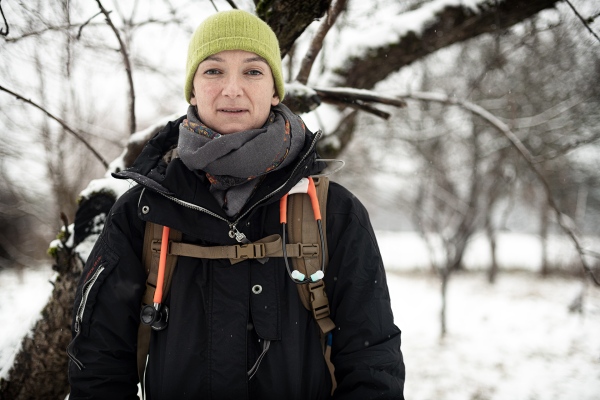
Interview with OLA G.
Rescuer helping refugees in the Bialowieza Forest
(March 21, 2023)
"My name is Ola, and I am a medic of the Granica Group. I regularly spend around 10-12 days each month at the border and in the forest, providing medical assistance to people on the way.
The most common problems we encounter, of course, vary depending on the season, but generally include hypothermia, hypoglycemia, dehydration, and people getting poisoned from drinking water from the swamps. The lack of potable water in the forest is a major issue, and in desperation, people often drink water heavily contaminated with E.coli bacteria, which is much more harmful than drinking water from a puddle in a village. This leads to symptoms such as diarrhea, vomiting, and severe stomach pains, which exacerbate their dehydration and prevent them from continuing the journey.
Most often, I connect them to a drip that quickly hydrates them and I give them drugs to inhibit the growth of bacteria. I also administer painkillers, and after the drip, they are usually able to continue on their way.
There was a time when I had to call an ambulance for a man who had been poisoned with swamp water and was hypothermic. Despite receiving a large amount of painkillers and diastolic drugs, and fluids, he was still unable to continue his journey.
Usually, the ambulance doesn't come, but instead, the police and the border guards come, who don't have any medical personnel with them. This is unthinkable to me because if a situation is life-threatening, an ambulance should be dispatched. If the ambulance is unable to physically reach the location, I believe that the border guards should have people with medical education in their car to assess and provide assistance during the transportation, as they are not able to provide medical care to the person in need.
It is a strange situation that they do not have a medical personnel with them in the car when responding to a call, with five people showing up for just one man in the forest - three from the Border Guards and two police officers - as it was the case in this situation. And there are simply no medical personnel on board to assess and treat the person. When I offer to come along as a medic, they always refuse and say that there is no way to transport the person medically through the forest, so they put him in the car and drive away.
We have a hospital group that looks after all people from the forest who are sent to the hospital. This allows us to follow up with the person and know what is happening with them. The most optimal scenario is that the person is admitted to the hospital, where they can apply for asylum. They sign the necessary papers in the hospital, and depending on the decision of the border guards, they are either directed to a closed or open center for foreigners. However, in the worst case, if the person is deemed healthy by the Border Guards, he is simply push baked to Belarus.
Photo below: Two volunteers, one of them a doctor, provide assistance to Y.K (25 years old, engineer), a Syrian refugee in a state of second-degree hypothermia. The volunteers called an ambulance to ask for help for Y.K., but 4 hours passed before the fire brigade and the Border Guard arrived, with no doctor on board. Y.K. was taken to the Border Guard post, rather than to the hospital as recommended by the doctor. December 12, 2022
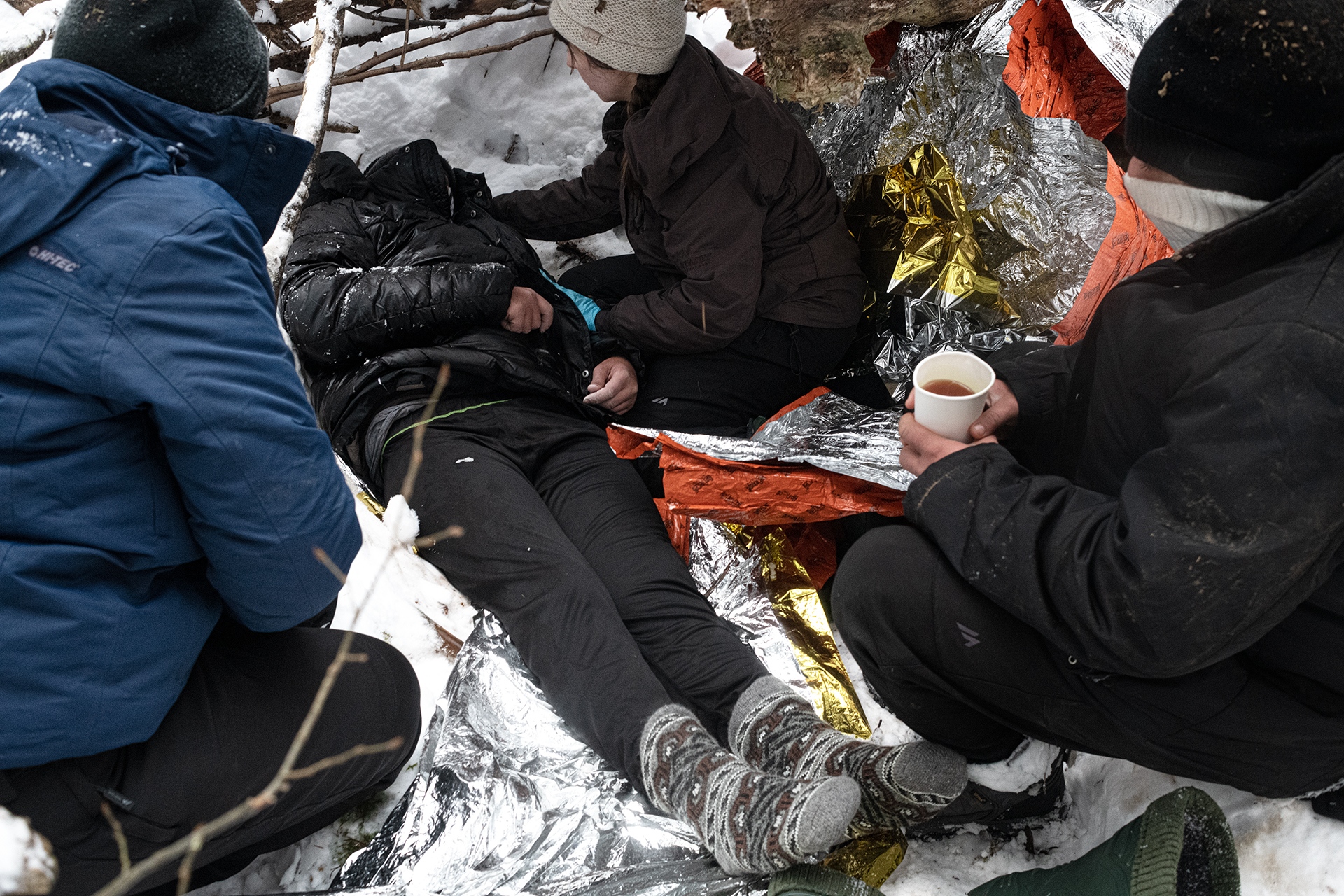
The specific medical problems we encounter have changed recently. We now see more cases of people falling from a height. The wall is 5 and a half meters high and these people just fall off it. These falls result in injuries to the lower limbs, such as fractures, sprains, and bruises.
We primarily see young men in the forest, which is related to the specificity of migration. Those who migrate are often the ones who are most likely to survive the journey and support their loved ones who have stayed in their country of origin. Therefore, young men endure the difficult journey. However, we also encounter young women, who are very often pregnant, and children.
It is more common to encounter children in spring, summer, and autumn when the road is relatively safer to travel. I didn't meet children in winter, but in summer yes, I did. I have three children and I can’t help but think about the children who are the same as my own. But these children are fighting for their lives alongside their parents, and they know what is at stake if they fail, and they're just determined to reach their destination.
Most of the women who crossed the border reported being in early pregnancy and believed that it would protect them as pregnant women often afford more protection in many cultures. Unfortunately, this is not the case at the Polish border, as even those who report being pregnant are often pushed back. (Read more about push backs)
Photo below: An injection that a rescuer had to give to a woman from Iran during the intervention in the forest. March 18, 2023
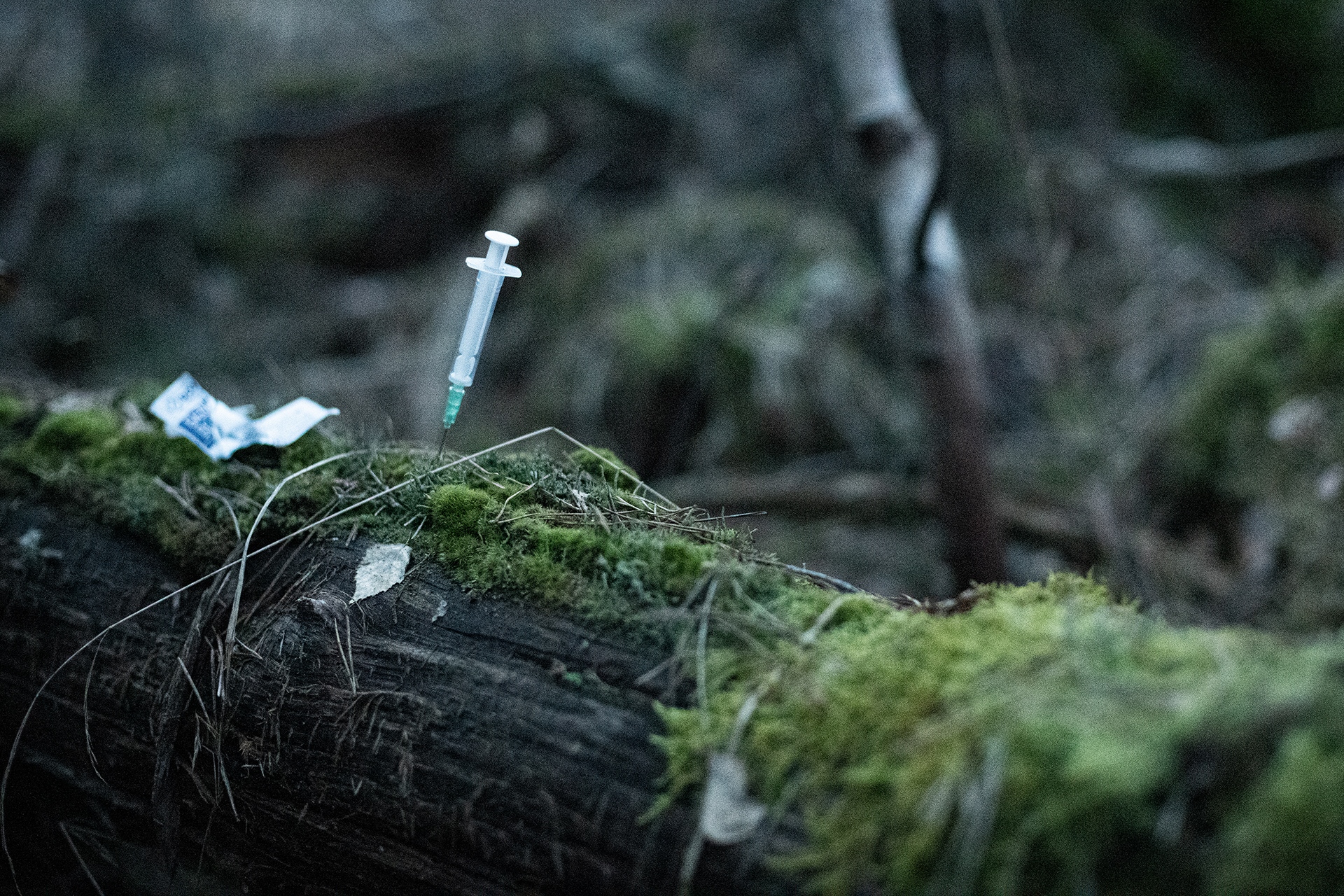
I once helped a woman who was already quite far along in her pregnancy, probably in her third or fourth month. I have visited this group in the forest several times. The group consisted of a married couple, likely from the Congo, with their two children - a three or four-year-old girl and a seven-year-old boy. At one point, when they were preparing to move on, the woman's water broke and she started miscarrying. I stayed with her from beginning to end, connecting her to a drip, giving her painkillers, and waiting until the miscarriage was over, with the children and her husband by her side. Since there was no way to separate them, they were all aware of what was happening.
I knew that I would be with this woman, and I was prepared to call for help if her condition worsened, such as if she experienced uncontrolled bleeding. However, I also knew that if I had called an ambulance earlier, the woman would have been hospitalized, but her husband and children would not have been allowed to stay with her. Given that this family had been pushed back several times before and that it was their third or fourth attempt to cross the border, I’m pretty sure that they would have been separated, and the husband and children would have been pushed back to Belarus without the possibility to request asylum. I knew that separating them could have meant that they would never be reunited.
Such situations happen when families are separated and pushed back to Belarus, and that's why we decided not to call an ambulance. We chose to stay with this woman and see how things developed. We took care of her during this time and when miscarriage was over, they went on their way.
As long as I am in Podlasie and employed as a paramedic, I approach my work as a task. I need to be prepared to leave quickly with my backpack packed, assess the situation, assist the individual and return. I am accustomed to this due to my over 10 years of experience working in neonatal intensive care, which was also mentally demanding job. As a paramedic, encountering difficult situations is a part of the job, and we learn to maintain a certain level of distance from it. It is something we may reflect on later, but it does not typically traumatize or break us down. However, I do question whether I could have done more or made different decisions, as I am solely responsible for medical decisions and I have no one to consult with.
In fact, my most challenging medical interventions as a paramedic in the forest have been when there was no prior notification of an emergency. This work is highly unpredictable, with sudden periods of intense activity followed by long periods of quiet. I am always on alert, waiting for the next emergency, and I am frequently on the phone, ready to spring into action at a moment’s notice. As a result, I must be prepared at all times, ready to put on my shoes, jacket, and head out into the forest whenever necessary.
Volunteering is the foundation of our work and I believe it would be beneficial to have another paramedic who can take over my duties when I am not available. Unfortunately, this is not currently the case, and we lack a paid professional to fill this role. In my opinion, it should be organized and systematized professional help rather than relying solely on good intentions. However this is unlikely to happen here.
Photo below: Ola giving pain killers to one of the refugees in the forest, November 2, 2022
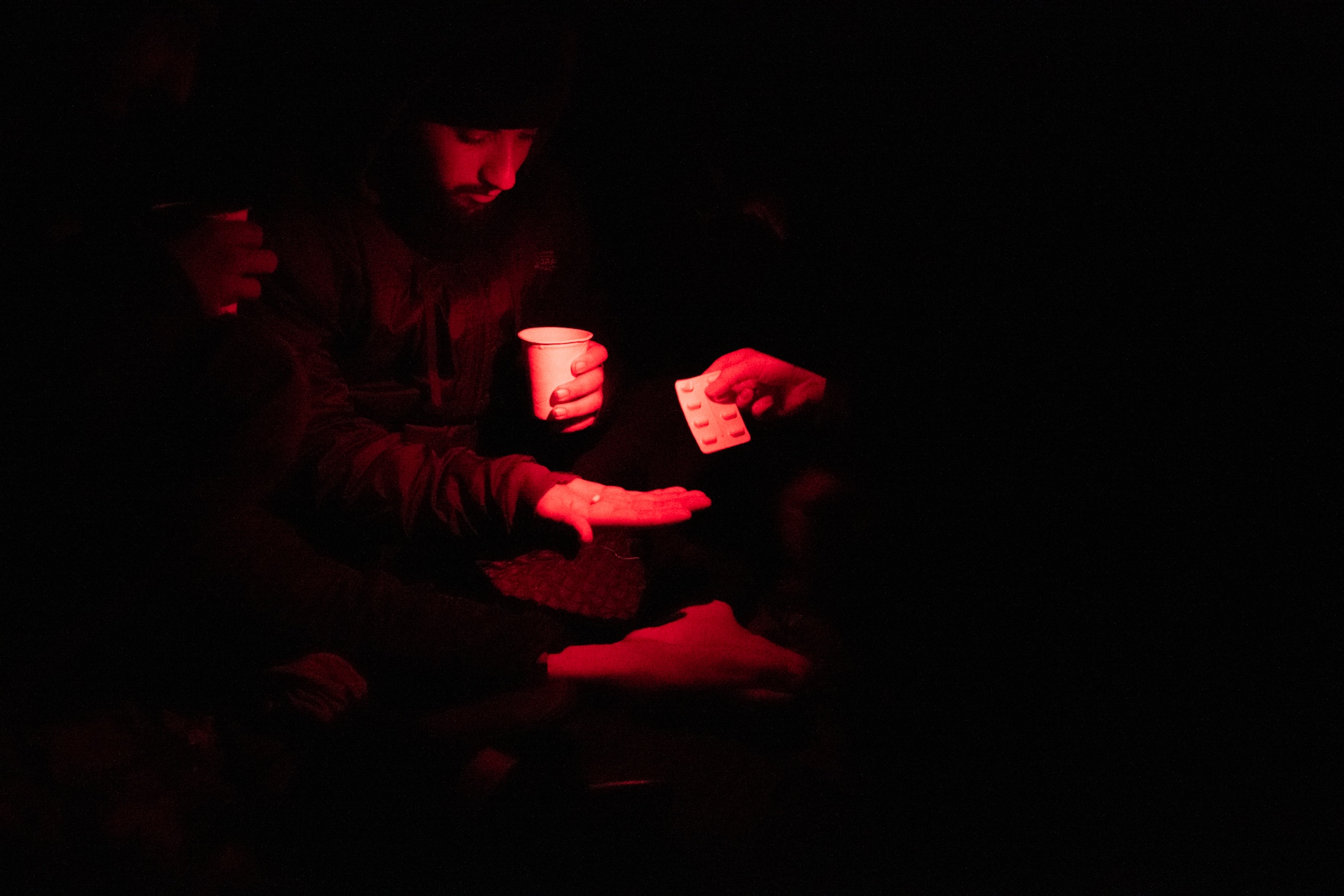
Reaching my patients in the forest can be a challenging task, and at times it feels like a guerrilla operation. Typically, we walk through the forest, and it is important to assess the type of forest we will encounter - whether it is a swamp, alder forest, or a dry forest that will allow for easier access. However, the forest and its conditions change depending on the season and weather, and what we thought would be a straightforward route can turn out to be challenging. Sometimes, we expect a difficult path, but find the forest dry and pleasant to traverse, almost like a picnic. Other times, we can cover only 200 meters in an hour, an unimaginable feat in a city setting. Such journeys leave us bruised, we arrive tired, and it is just the beginning of our work.
What's bothering me? That I never know if I'll make it to that group or not. Of course, this job is also physically tiring for me because I have to carry a very heavy backpack that contains all my medical supplies, as well as other items that the group might need, such as water and clothes. So the backpack is just heavy. Additionally, I am tired of knowing that this situation will never be resolved. Our government is known to be right-wing and totally against helping those refugees, penalizing our activities and the migration situation at this border. This is of course also with the consent of the European Union. Even if the government in our country changes to a more neutral one, there will never be a situation where these people can ask for asylum in a normal way and receive it in accordance with the law, under human conditions. This situation will not be resolved. This road has been opened, and it will continue like this.
Photo below: The Bialowieza Forest, March 9, 2023
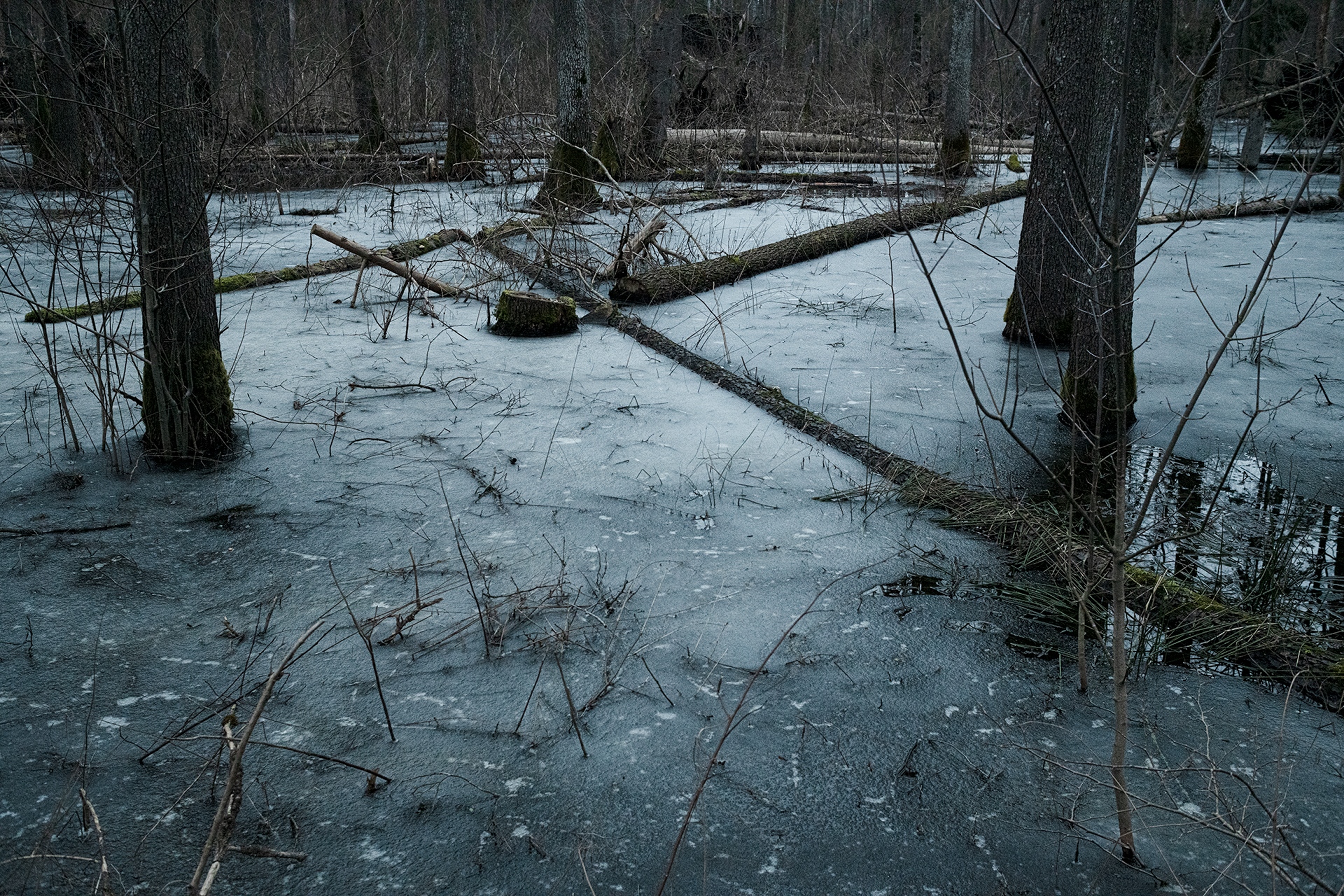
The image of refugees in Polish society is shaped by what people hear in the media. The message conveyed in the media is that these are dangerous people with bad intentions, who want to impose their religion, culture, etc. on us. This is, of course, nonsense. No one talks about the fact that many people from African countries are Christians. They are not dangerous in any way. Usually, women provide humanitarian aid at this border, so frequently I have been with two female colleagues in a group of 10-15 men, and I have never felt threatened by any inappropriate behavior, comments or gestures from them. Never, just never. I always felt 100% safe around these people.
It’s embarrassing when they thank me because the whole situation is awkward for me. It should be normal for someone to give them help. But when, for example, they spread a piece of foil somewhere for me to kneel down or sit, or when they give me a hand to help me go over a tree, it’s a gallant gesture that shows their respect and gratitude. It’s all they can do at this moment. These are simple human instincts.
They are the same people as us, only in an unusual situation. When we sit, talk and smoke cigarettes after feeding and watering them, we see that they are the same as us with the same problems, except that they are in a very bad situation at that moment."
Update Required
To play the media you will need to either update your browser to a recent version or update your Flash plugin.
Podcast (in polish)
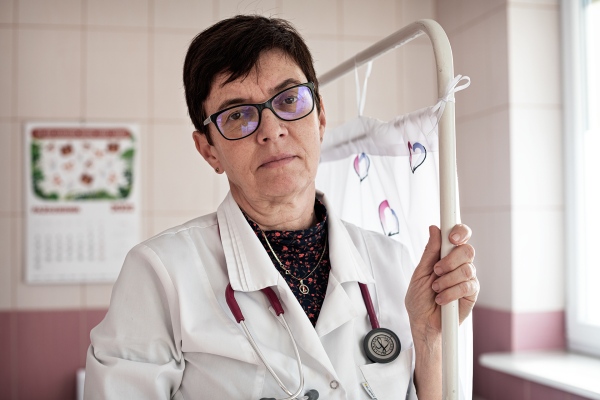
Interview with Lucyna Marciniak
doctor at the Communal Health Center in Bialowieza
(October 18, 2022)
"My name is Lucyna Marciniak, and I am a doctor at the Communal Health Center in Białowieża. I specialize in internal medicine and pulmonology, and I have been residing in Białowieża for the past six years.
We became aware that something unusual was happening at the border, but we were entirely unprepared for the situation that unfolded on September 2021 when we found ourselves confined within the so-called "zone" and were isolated from any external assistance. Suddenly, refugees who had crossed the Belarusian border started appearing in our region, seeking help in our forests. Unfortunately, there was no one available to assist them. The official narrative from the top emphasized the slogan "Murem za mundurem," (to 'stay firm behind the uniform.') According to this, our allegiance was expected to lie with all uniformed services, including border guards, the army, and the police. However, helping refugees, regardless of the circumstances that led them to our side, was deemed a crime.
This presented us with significant moral dilemmas initially because we soon realized that reporting the presence of refugees to the Border Guards didn't equate to providing assistance; instead, it meant them being pushed back to the Belarusian side. The first crucial decision we had to make was to stand against uniformed forces and officials, as their actions were not in the best interest of the refugees. With an increasing number of people, worsening weather conditions, and encounters with individuals exhausted from the journey and dehydrated in wet clothes, there was no room for discussion. We, the residents of Białowieża, decided to help to the best of our abilities.
Officially, my role was limited. However, being in a restricted zone meant that no rescue services could enter, so my duties involved roughly assessing the conditions of individuals in the forest. This was not an in-depth diagnostic process but a basic evaluation of vital functions, determining whether the person could function independently or required hospitalization. If admitted, the patient received all necessary medical assistance. This also allowed a few days for assessing their situation, providing an opportunity for the individual to explain why they were there and whether they wished to apply for international protection, dealing with the formal and legal aspects. Unfortunately, there were instances when a patient recovered sufficiently to be discharged, only for the Border Guards to retrieve them and return them to the border, leaving them in the forest.
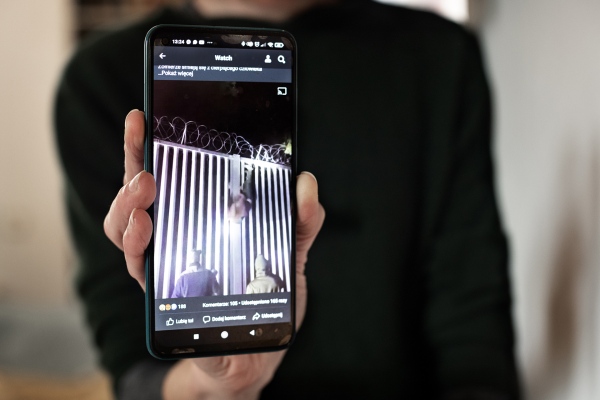
At the beginning, when we met these people in the forest, our aim was to quickly provide them with the necessary documents to sign, ensuring they had a proxy before falling into the hands of the Border Guards. However, in many instances, it became apparent that these documents likely ended up in a garbage. Another challenge arose when those who identified themselves as proxies had no access to refugees held in Border Guard facilities. These situations posed numerous difficulties, compounded by the unfamiliarity of the procedures, which were conducted in the forest and under the cover of darkness. The added stress, nervousness, and language barriers, especially when there was no translator due to lack of coverage in the forest, created a problem at every turn. Placing someone in the hospital appeared to be a means of increasing the likelihood of meaningful assistance.
The official procedure dictated that refugees discovered by the Border Guards in the forest were to be transported back to the Belarusian side. This involved packing them into a truck, taking them to the fence, and, in a more or less direct manner (read about pushbacks), persuading or pushing them to cross the fence back into Belarus. There, Belarusian Border Guards awaited, employing typically brutal methods to push these individuals back. Some experienced this journey back and forth several or even a dozen times. Each unsuccessful attempt, aside from the physical exertion involved, stripped individuals of their dignity, causing profound mental harm.
I cannot, in good conscience, affirm that our services treated these individuals well. Recently, a disturbing incident was captured on film, depicting a man hanging on the fence. Rather than assisting him, knowing he was on the verge of falling, uniformed services stood idly by, seemingly amused by his predicament. I find it incomprehensible.
Photo: A local volunteer displays on her phone an image from a video depicting a refugee left hanging upside down on the fence, with one leg caught in the concertina above. October 26, 2022."
The official procedure dictated that refugees discovered by the Border Guards in the forest were to be transported back to the Belarusian side. This involved packing them into a truck, taking them to the fence, and, in a more or less direct manner (read about pushbacks), persuading or pushing them to cross the fence back into Belarus. There, Belarusian Border Guards awaited, employing typically brutal methods to push these individuals back. Some experienced this journey back and forth several or even a dozen times. Each unsuccessful attempt, aside from the physical exertion involved, stripped individuals of their dignity, causing profound mental harm.
I cannot, in good conscience, affirm that our services treated these individuals well. Recently, a disturbing incident was captured on film, depicting a man hanging on the fence. Rather than assisting him, knowing he was on the verge of falling, uniformed services stood idly by, seemingly amused by his predicament. I find it incomprehensible.
Photo: A local volunteer displays on her phone an image from a video depicting a refugee left hanging upside down on the fence, with one leg caught in the concertina above. October 26, 2022."
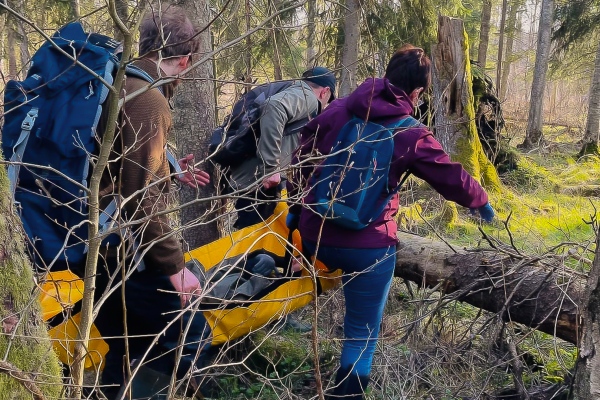
I am aware, on the other hand, that many individuals serving in the Border Guards, police, or the army were mentally exhausted. There were instances where they approached me seeking assistance, typically in the form of leave, expressing that they could no longer bear the burden of the service imposed on them. It's crucial to recognize that this group of people also faced their own challenges, and it would be unfair to categorize them all as bad. The entire situation seemed orchestrated to boost their mental resilience for the tasks at hand. The government incited them to act against those providing assistance, fostering an environment of animosity among us, the citizens of a relatively small space where we coexist. It's deplorable.
Fortunately, I personally have not experienced confrontations with uniformed services, but I've heard from friends about the treatment of so-called activists—individuals running around the forest with backpacks providing help. They recounted dramatic situations where they were accused of committing a crime, facing potential punishment. Often, these activists were humiliated, thrown to the ground, and treated as if they were criminals. While I acknowledge that the uniformed services have their duties, I believe there could have been a more humane approach, even considering the extreme circumstances.
I was personally involved in a situation where we evacuated a sick child from the forest (read her story), carrying her out. When an ambulance arrived, the first responder was a Border Guard, a resident of our village. His approach, the shouting, the threats regarding the costs of medical transport, created a nightmarish scene. Finally, he inquired about why the child was lying there. When we explained that the child was sick and unable to walk due to neurological reasons, it was embarrassing. This is not how I envision state services acting, especially in a situation involving a sick child. Such scenarios, whether it's a sick child or a pregnant woman, are traditionally sacred, but here, it is not the case.
Photo on the left (Eliza Kowalczyk): Lucyna Marciniak assists in transporting a sick 9-year-old child from Palestine out of the Bialowieza Forest. April 28, 2022.
Fortunately, I personally have not experienced confrontations with uniformed services, but I've heard from friends about the treatment of so-called activists—individuals running around the forest with backpacks providing help. They recounted dramatic situations where they were accused of committing a crime, facing potential punishment. Often, these activists were humiliated, thrown to the ground, and treated as if they were criminals. While I acknowledge that the uniformed services have their duties, I believe there could have been a more humane approach, even considering the extreme circumstances.
I was personally involved in a situation where we evacuated a sick child from the forest (read her story), carrying her out. When an ambulance arrived, the first responder was a Border Guard, a resident of our village. His approach, the shouting, the threats regarding the costs of medical transport, created a nightmarish scene. Finally, he inquired about why the child was lying there. When we explained that the child was sick and unable to walk due to neurological reasons, it was embarrassing. This is not how I envision state services acting, especially in a situation involving a sick child. Such scenarios, whether it's a sick child or a pregnant woman, are traditionally sacred, but here, it is not the case.
Photo on the left (Eliza Kowalczyk): Lucyna Marciniak assists in transporting a sick 9-year-old child from Palestine out of the Bialowieza Forest. April 28, 2022.
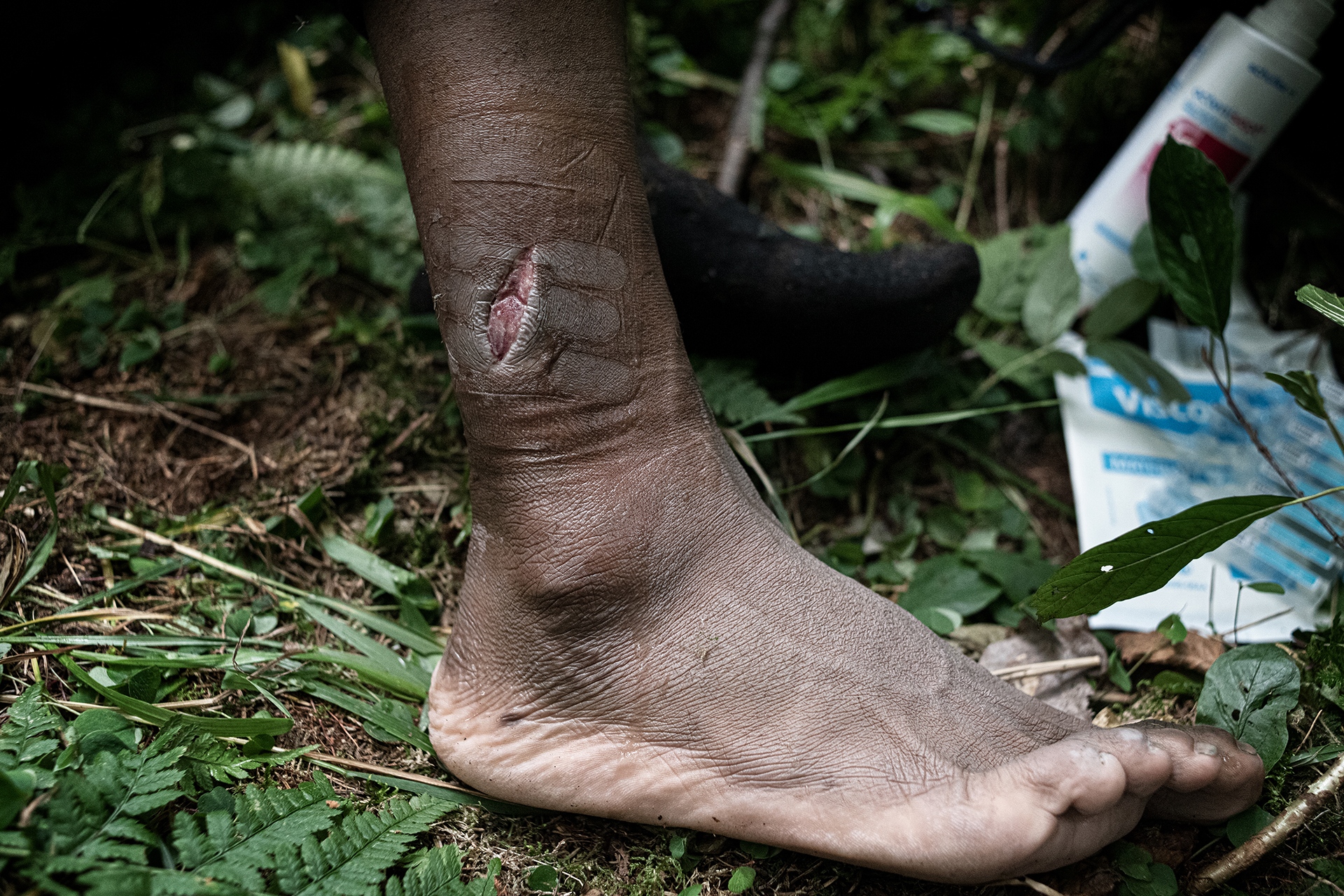
We, as residents, have now experienced some relief from our role in providing assistance. Moreover, the closed zone has been lifted, allowing people from outside to come and offer help. However, the arrival of Border Guards' cars at the forest exit and the evening presence of helicopters signal incoming individuals. There is a noticeable increase in injuries now, as people attempting to cross the fence either jump or inadvertently hurt themselves. In my capacity as a doctor at the municipal health center, I also provide services when the Border Guards bring me refugees from their facility, seeking my opinion on their suitability for further transport. Recently, they brought me two individuals who had crossed the fence and injured themselves on the razor wire on top. The extent of wounds on their hands, forearms, and thighs was unimaginable, akin to razor cuts every half-inch. The suffering of these young individuals was profound. We treated them in our clinic, almost metaphorically covering their wounds with our tears. Consider the distress of a single finger cut, and then multiply it by dozens. And as winter approaches again, the profile of these health problems will likely shift.
This situation is absurd from every perspective. For months, during the fence construction, as the sole medical provider, I provided medical advice to the builders and those managing materials. Conversations with everyone revealed not a single person who believed it made any sense. It is undeniably an environmental devastation, causing destruction in many parts of the forest. Additionally, global experience shows that walls in different parts of the world do not solve the underlying problems. While they may serve as physical barriers, inventive individuals can find ways to overcome them. However, the associated costs are substantial, and the wall doesn't offer a genuine solution to the issue.
Photo: A refugee from Senegal displays injuries caused by concertina blades after climbing the border fence. August 21, 2022.
This situation is absurd from every perspective. For months, during the fence construction, as the sole medical provider, I provided medical advice to the builders and those managing materials. Conversations with everyone revealed not a single person who believed it made any sense. It is undeniably an environmental devastation, causing destruction in many parts of the forest. Additionally, global experience shows that walls in different parts of the world do not solve the underlying problems. While they may serve as physical barriers, inventive individuals can find ways to overcome them. However, the associated costs are substantial, and the wall doesn't offer a genuine solution to the issue.
Photo: A refugee from Senegal displays injuries caused by concertina blades after climbing the border fence. August 21, 2022.
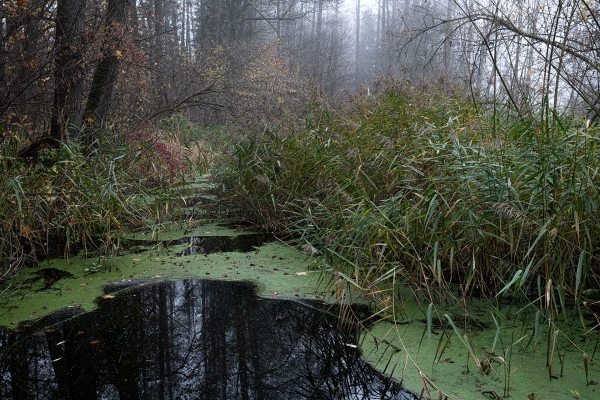
I was raised with the belief that laws and rules are meant to be followed. However, when these laws or recommendations dictate that aiding a sick, hungry, overtired, or wounded person constitutes a crime, I find myself questioning if we have gone too far and something is fundamentally wrong. At a certain point, I decided that I don't care what they label it. After all, I swore an oath as a medical professional to always provide assistance, and I am committed to that oath. Staring into the eyes of someone in need has the power to soften even the toughest individual. While there may be debates about whether they should be here or go to Germany, the fact remains that they are here, and they need basic-level assistance. This is not up for discussion.
We are aware that dozens of people are missing in this area, and the official count of bodies found (read about deaths and disappearances) is significantly distorted. Many individuals have simply vanished without a trace in swamps or peat bogs, and we may never discover their fate.
Photo: In the Bialowieza Forest, numerous swamps exist, some of which are extremely perilous. Refugees have, on several occasions, become trapped, requiring rescue, and tragically, some have drowned. November 11, 2022.
We are aware that dozens of people are missing in this area, and the official count of bodies found (read about deaths and disappearances) is significantly distorted. Many individuals have simply vanished without a trace in swamps or peat bogs, and we may never discover their fate.
Photo: In the Bialowieza Forest, numerous swamps exist, some of which are extremely perilous. Refugees have, on several occasions, become trapped, requiring rescue, and tragically, some have drowned. November 11, 2022.
Update Required
To play the media you will need to either update your browser to a recent version or update your Flash plugin.
PODCASTS (in polish)